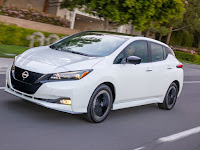Think about your car(s). It's probably your biggest expense after your house. Or if you don't have a house, your biggest expense. With car payments, maintenance, insurance (which has gone up a lot lately), gas (don't get me started), it's expensive to keep a car.
But what does your car do most of the day? It sits. You drive it to work in the morning, it sits until you go home. You get home, and it sits until you drive to work the next day. Oh, sure, you might take it somewhere like to the grocery store or to visit someone, but still it sits a lot.
I was writing this novel (that has been overtaken by events) where AI pretty much runs everything, at least in the U.S., and there are robots that help humans do a lot of things. It was a benevolent AI, at least it appeared to be so.
One of the concepts I had in the novel was that very few people owned cars. And those that did were the rich. Everyone else used public cars that were very cheap. Cheaper than owning a car. (Public transportation such as buses and light rail were free.) The cars were 100% electric and autonomous. Like Uber, you used as app on your phone to hail one, or the AI could learn your habits and have one waiting for you when you leave for work and when you go home.
(Not too long ago I heard Neil deGrasse Tyson talk about this very idea but that was after I started writing the novel.)
After a day, the cars would be washed inside and out. If someone tried to vandalize one (or used it for a bathroom), it would take them to the police station for the robots cops to deal with (there were still a few human police officers).
There would be no need for huge parking lots around stores as the cars would drop people off and then pick them up after shopping. Those parking lots could be turned into grassy areas or even parks.
There are, however, lots of privacy problems with this concept. And what if someone hacked into your public car and drove it off a bridge? Plus, I would hate this. I like driving and I like driving fast cars.
I kind of imagined them white inside and out and pod-like. If you wanted to spend more money, you could have a nicer one. And if you have enough money, you could own a nice car. I also had the very rich own "antiques" that were not autonomous and were limited to 80 km/h (~50 mph) on public roads.
Here's a short, funny video about this concept.
What do you think of my concept (or deGrasse Tyson's concept)? Would you be willing to give up your cars for a publicly owned pod? Let me know in the comments below.




